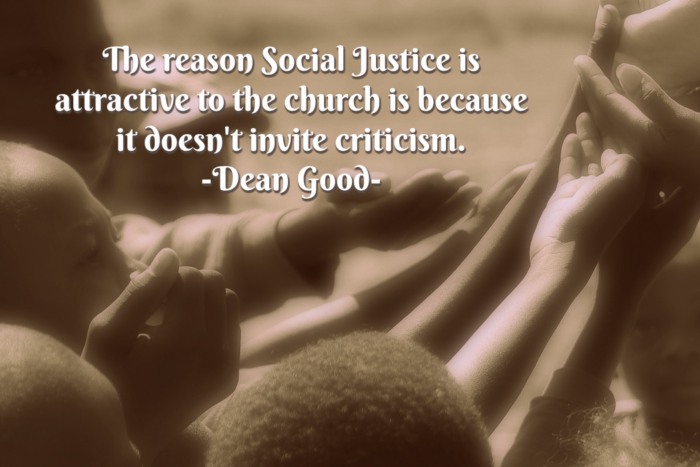
I have been meaning to write this post for a while now. I have also been dreading it. I know that most of you–my readers–are going to disagree with this post (I even disagreed with it myself a few years ago!) However, I also recognize that this is probably the area that Christians are most vulnerable in this age that is driven by mysticism (experience=truth) and clouded by pragmatism (if it works, it must be true).
I also want to say right up front that if you don’t agree with me, I hope that you will stick around and that we can still be friends. I am not demanding that you believe as I do, but, instead, just ask you to open your mind as I simply share why I believe that the scripture teaches this. I ask you to do some digging of your own into the Word rather than just imbibing the messages of fallible authors, pastors, and teachers or listening to the experiences of friends.
A few months ago, I had a conversation with someone. We were talking about whether or not God still speaks to individuals today. The woman adamantly assured me that special revelation most certainly does continue. When pressed, however, for scripture to back up her viewpoint, she couldn’t give any.
Honestly, that used to be me. Until a good friend started talking with me about this and opened my eyes to the ramifications of this belief. If this is true, then the words God speaks to us must, by their very nature, be as authoritative as the words of the Bible. Wow. That is a Pandora’s box that we will never close once the lid is cracked (and this is exactly what is going on today). This same friend also handed me a book that not only changed my mind but also deepened my conviction called “Is That You, Lord: Hearing the Voice of the Lord, a Biblical Perspective” by Gary Gilley. I can’t recommend it highly enough.
Almost always, the Old Testament or the book of Acts is the go-to for those who do use scripture to back up their case for special revelation. But there are a few problems with this. First, the Old Testament was under a totally different covenant and during the time when the Holy Spirit was not indwelling believers, so we can expect God’s communication with men to be very different than under the New Testament covenant. Regarding the book of Acts, we can see that if we carefully study the New Testament as a whole that Acts is a transitional book that had many unusual and supernatural occurrences as God built the early church. If you would like to know more about this, I encourage you to read Pastor Dean’s short essay on this very thing, which you can find here.
I thought I’d share with you some other reasons that I have arrived at the conclusion that the sign gifts and special revelation are not applicable to us today.
First, we cannot possibly know if we are hearing from God or Satan (or a demon). 2 Corinthians 11:14 makes it clear that Satan comes as an angel of light. This means he pretends to be something he is not in order to deceive. So let’s say you hear a voice say something to you. Even if it is a good thing—perhaps to help a neighbor—how can you possibly know it came from God? How can you know with absolute certainty? You see, Satan could feasibly pretend to be good—perhaps even for many years—until you trust that voice and listen to that voice. And then he will suddenly start to steer you off the narrow path. He is like a lion who wants to devour us and he is a deceiver. We dare not underestimate him when it comes to hearing a voice in our head.
Second, as we study the gifts we can see that the sign gifts as described in the Bible are absolutely nothing like the sign gifts of this modern age. Two really obvious examples are tongues and healing. First, tongues in the Bible (see Acts 2) were actual languages that were used to tell foreigners of the Savior. They were always used to bring glory to God and never to self and they were always to be interpreted (See I Corinthians 14). This is in complete opposition to the gibberish of today, which is rarely (if ever?) interpreted and looks much more similar to the demonic sects of Hinduism and other false religions. The similarities are truly shocking! As for healing—Acts 5 shows that even Peter’s shadow healed people who were obviously sick and dying. Today, modern apostles who claim to heal never heal radically. It’s always something you can’t see such as headaches or lengthening a leg. Never radical healing where someone with spina bifida can walk instantly or someone in hospice is radically healed in the blink of an eye. That is because the time for that is over. NOW, can God heal? Yes, yes, yes! He can and He does. Being a cessationist doesn’t mean you don’t believe in miracles. God works in marvelous ways and I have been privileged to see that on occasion. I just don’t believe He gifts prophets to do that healing in this day and age and I don’t live for miracles. Perhaps that is the biggest difference between a cessationist (someone who believes the sign gifts have ended) and most continuationists (someone who believes the sign gifts continue): Cessasionists appreciate miracles and we praise God for them, but they are not what make up the excitement or substance of our Christian lives.
Third, God put Himself in a box. Inevitably, the argument is always that we can’t put God in a box, but I want to assure you that God did that Himself. When we read His word, we see a couple of things that stand out. First, I Timothy 3:16 says this—
All Scripture is given by inspiration of God, and is profitable for doctrine, for reproof, for correction, for instruction in righteousness, that the man of God may be complete, thoroughly equipped for every good work.
Do you see verse 17 says that scripture will make us complete and thoroughly equipped? We don’t need any other word from God or special experience to equip us for the Christian life.
And Jude 3 says this—
Beloved, while I was very diligent to write to you concerning our common salvation, I found it necessary to write to you exhorting you to contend earnestly for the faith which was once for all delivered to the saints.
Do you see the words “once for all”? This means that we shouldn’t expect any more revelation from God. As I already mentioned above, if God is speaking to us today those words must hold the same weight as the Word of God. No revelation from God can be more important than another one. And this causes us a major problem–especially because so many who claim to hear from God speak things in complete opposition to the Bible. In fact, did you know that almost all false religions started with a vision or “special message” from God? Do a little research and you will see. It is a sobering reminder of just how deceptive and crafty Satan really is.
Fourth, experience is the opposite of faith. The accusation I hear frequently is this: If we don’t believe in the sign gifts and special revelation, we are lacking in faith. But I would beg to differ. I believe that those who must rely on special experiences are actually the ones lacking in faith. We read this in Hebrews 11:1–
Now faith is the substance of things hoped for, the evidence of things not seen.
Faith means we haven’t seen or felt or heard it physically but are trusting God and His Word that what He says will come to pass. We must have faith to believe that He has saved us through grace alone in Christ alone. True faith means that we don’t need any special messages or visions to confirm this.
Fifth, God’s special revelations in the New Testament always had to do with growing the Church and sharing the Gospel. They were rarely (if ever?? I’ve not done a thorough study) about someone’s personal dreams or desires or health or wealth. For example, in Acts we see several places where Peter and Paul experienced the supernatural, but it was always to point people to God and the Gospel. It always had to do with furthering God’s Kingdom and had nothing to do with their own selfish motivations and desires. This is a rather significant contrast to most special revelations claimed today.
Sixth, we must do a careful evaluation of the fruit that has resulted from the movement that promotes and endorses these things. I have not seen churches grow stronger or sounder or more biblical as a result of practicing the “spiritual gifts” but instead we see, as a general rule, movement away from the sufficiency of scripture and sound doctrine, while moving towards mystical, experience-based religion that has no absolutes. Individually, most end up in a self-absorbed, mystical religion that is always hungering for the next experience, which inevitably takes their focus off of studying, submitting to, and obeying the Bible.
And seventh, and most importantly, is that the emphasis on special revelation always takes the emphasis off of the Word and places it on to personal experience. Interestingly enough, we know from a study of the book of Revelation that in the last days there will be a one world religion. This religion will draw all men together into the final false religion of the antichrist. If we take an honest look at the fruit of the charismatic and NAR movements, we can see that they are drawing men away from the Word and making them reliant on mystical experiences. This is exactly what Satan wants. You can’t rely on experience and on the Word. They are mutually exclusive. So we can see that this movement is drawing men away from true Christianity into this mystical one-world religion that is coming.
So these are some of my reasons.
BUT what about…
I know you are asking it, so let’s just go there. What about the time that I felt like I just needed to pray for someone and found out later that they needed prayer at just that time? Or the time that I could “hear” the Lord say “give so-and-so some groceries” and I find out later that they desperately needed those groceries?
Phil Johnson has written a great post on this, which you can find here. But I want to share this quote from it that, to me, wraps it all up rather nicely–
I am convinced by all the clear commands and best examples of Scripture that God would have us seek understanding and guidance by looking into the more sure Word of Scripture, rather than listening to the declarations of uncredentialed modern “prophets” who frankly admit that they often mistake their own imaginations for revelation from God.
What does this have to do with providence? Glad you asked. I’m willing to acknowledge that God has sometimes employed my intuitive hunches, spontaneous notions, subliminal logic, unconscious thoughts, or whatever, to order my steps providentially.
I emphatically deny that this is a form of prophecy or revelation, because it is notoriously fallible. And following your sense of intuition will get you in trouble at least as often as it works out well. To regard one’s intuition as a gift of prophecy or claim it as a kind of special revelation is really no better than what pagan fortune-tellers and occult clairvoyants do.
Now this is something to think about, isn’t it? Are your hunches and intuitions and impressions and thoughts of action always right on? Mine are certainly not. And that is how we know that God can use them but they aren’t prophecies or special revelation. I encourage you to read Phil’s entire post if you would like to understand this subject better.
Now, after all of this, I recognize that many (probably most) of you will not agree with me on this. I share this post to just encourage you to not come to your conclusion lightly as you ponder this subject. I did this myself and I believe that I came to the wrong conclusion. If not for my friend, I would still be at that same place–strongly holding an opinion that I don’t believe, after studying the scriptures, was the right one.
I want to reiterate that I do not share this to cause division and I still warmly consider you as part of my Christian family, even if we disagree on this area. This is one of those secondary issues that seems fuzzier than it should. It’s one of those things I’d like to ask God about when I get to heaven. Sooooo why didn’t you make it clearer, God? My suspicion is that if it was clear the mainstream church (as opposed to the remnant of the true Church) would never be drawn into the one world religion predicted in the last days, but time shall tell.
Well, I hope this post has been an encouragement to those who agree with me, and that it has caused those of you on the fence to really think about what you believe, and that it will drive those of you who disagree with me into the Word to disprove what I have written.
I’ve said this before but I’ll repeat it: My opinion on this doesn’t matter. At all. Don’t rely on me. Go to the Word. We must get our opinions on biblical matters from the Bible. Personally, I believe this is what the Word teaches after extensive study. I simply suggest that you, too, only make a firm opinion about this after doing your own study of the issue with a humble and submissive heart.










